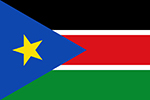
Population
11M+
CHRISTIAN PERSECUTION STATUS
minimal
Freedom
CHRISTIAN POPULATION
60%
Status of
the church
The population of South Sudan is one of the few in the Middle East that has a Christian majority, with many different denominations represented. There is also a significant Muslim minority. Many people in rural areas practice traditional African beliefs.
The 2011 transitional constitution allows for freedom of religion and forbids religious discrimination. Members of different religions generally live side-by-side in peace, and faith groups have promoted peacebuilding since the current civil violence broke out.
The violence in South Sudan, already one of the world’s least developed countries, has displaced millions. More than half the population is on the brink of famine. There are documented systematic human rights abuses, including rape, killing, pillaging, and the use of child soldiers.
FGM (Female Genital Mutilation) is a widespread practice in South Sudan, with an estimated 87% of girls and women affected (Unicef).
Approximately 11.8 million in South Sudan have access to the Internet.
Location
Prayer points
What our viewers are saying
South Sudan
FRESH START FOR SADDENED SUDANESE WOMAN »